Hospitality Industry: Exploring Organizations, Roles, and Skills
VerifiedAdded on 2023/01/11
|11
|3194
|42
Report
AI Summary
This report provides an overview of the contemporary hospitality industry, focusing on business organizations, roles, and skills. It explores different types of business organizations within the hospitality industry, including accommodation, travel and tourism, food and beverage, and recreation and entertainment. The report examines the functional and operational departments within Rocco Forte Hotels, such as housekeeping, front office, finance, and human resources. It also discusses the contribution of the hospitality industry to world, national, and local economies, highlighting its significant impact on employment and GDP. Furthermore, the report identifies various roles within the hospitality industry, including managers, housekeepers, security professionals, kitchen supervisors, front-desk executives, and back-end executives, outlining the skills required for each. Finally, it addresses the current skill shortages in the industry, emphasizing the importance of communication, technical skills, and problem-solving abilities for success in various hospitality roles.
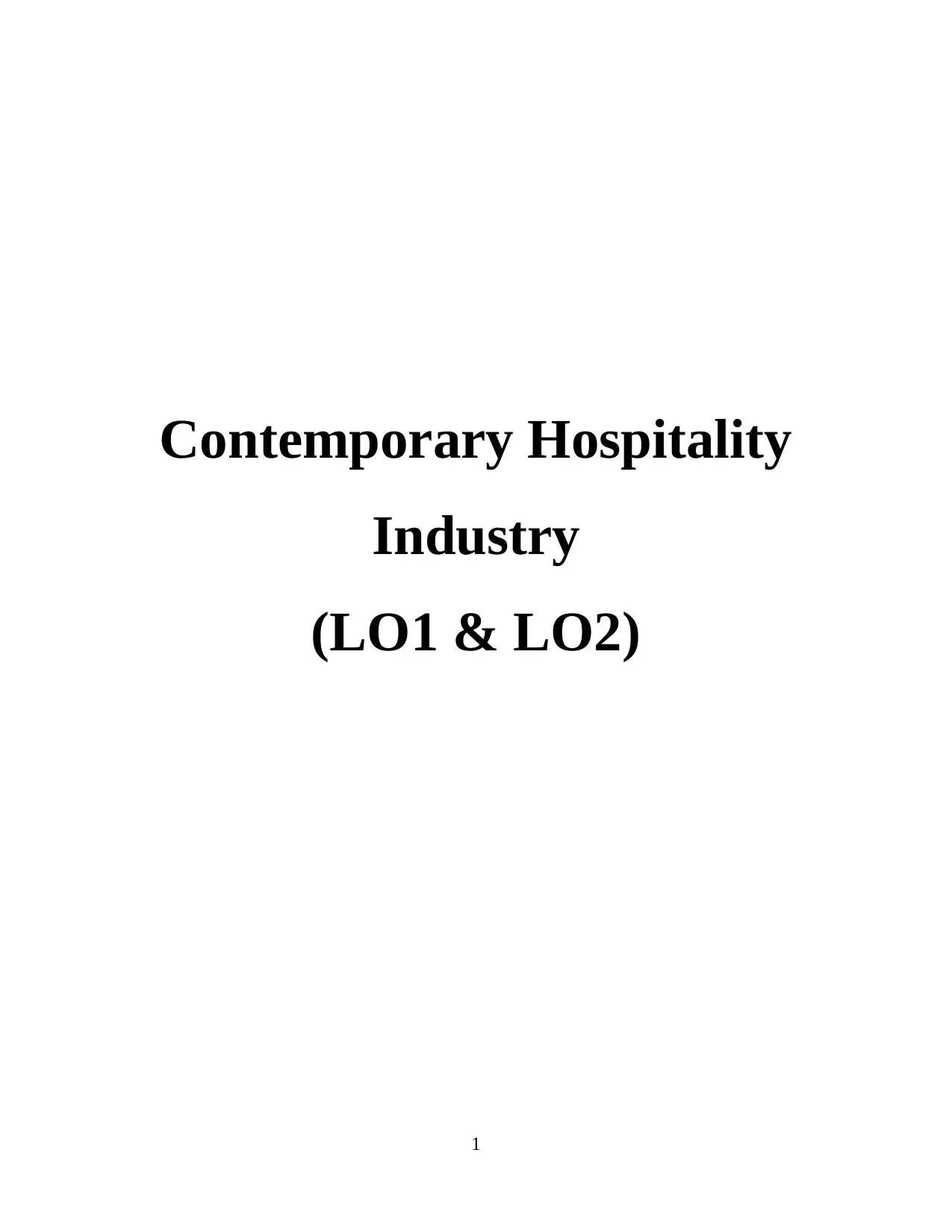
Contemporary Hospitality
Industry
(LO1 & LO2)
1
Industry
(LO1 & LO2)
1
Paraphrase This Document
Need a fresh take? Get an instant paraphrase of this document with our AI Paraphraser
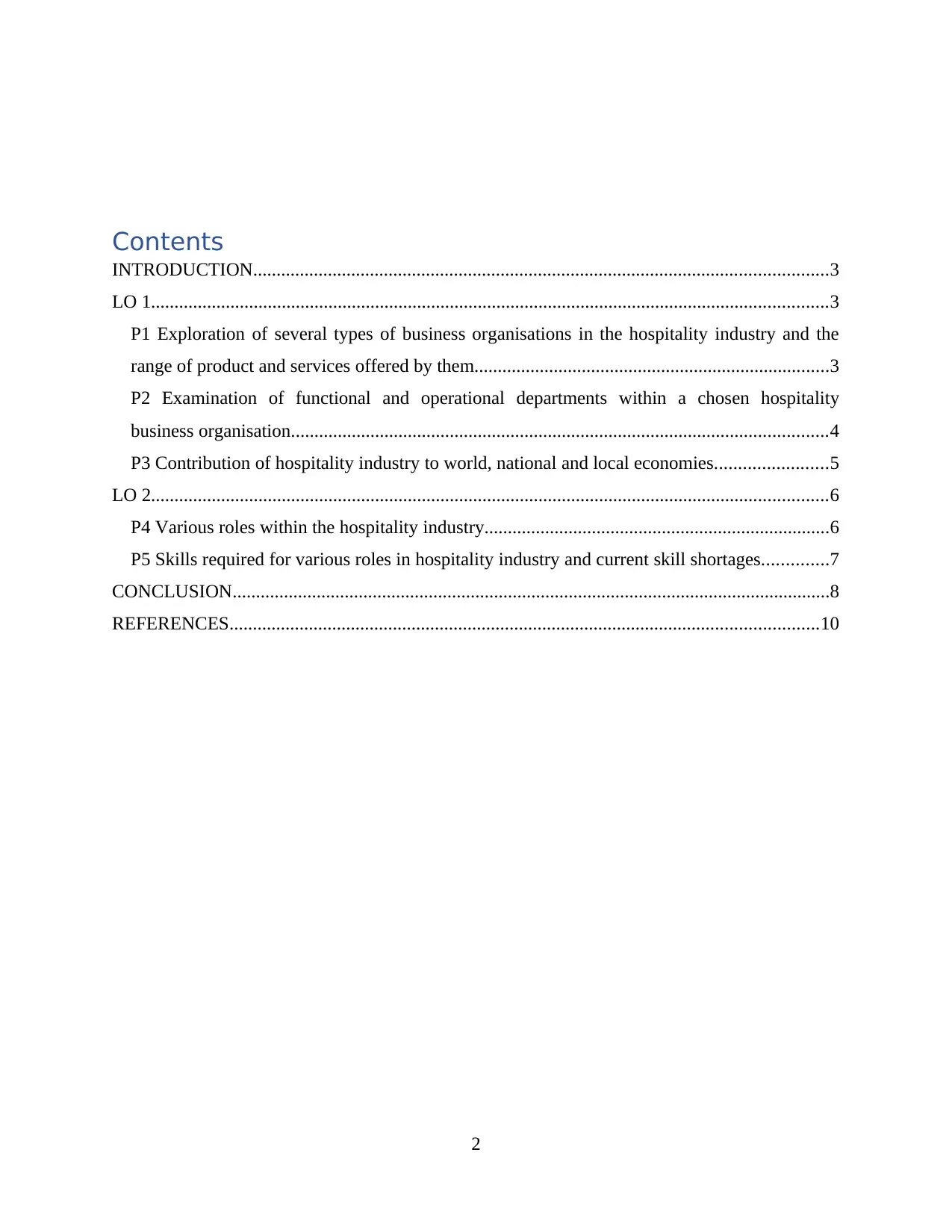
Contents
INTRODUCTION...........................................................................................................................3
LO 1.................................................................................................................................................3
P1 Exploration of several types of business organisations in the hospitality industry and the
range of product and services offered by them............................................................................3
P2 Examination of functional and operational departments within a chosen hospitality
business organisation...................................................................................................................4
P3 Contribution of hospitality industry to world, national and local economies........................5
LO 2.................................................................................................................................................6
P4 Various roles within the hospitality industry..........................................................................6
P5 Skills required for various roles in hospitality industry and current skill shortages..............7
CONCLUSION................................................................................................................................8
REFERENCES..............................................................................................................................10
2
INTRODUCTION...........................................................................................................................3
LO 1.................................................................................................................................................3
P1 Exploration of several types of business organisations in the hospitality industry and the
range of product and services offered by them............................................................................3
P2 Examination of functional and operational departments within a chosen hospitality
business organisation...................................................................................................................4
P3 Contribution of hospitality industry to world, national and local economies........................5
LO 2.................................................................................................................................................6
P4 Various roles within the hospitality industry..........................................................................6
P5 Skills required for various roles in hospitality industry and current skill shortages..............7
CONCLUSION................................................................................................................................8
REFERENCES..............................................................................................................................10
2
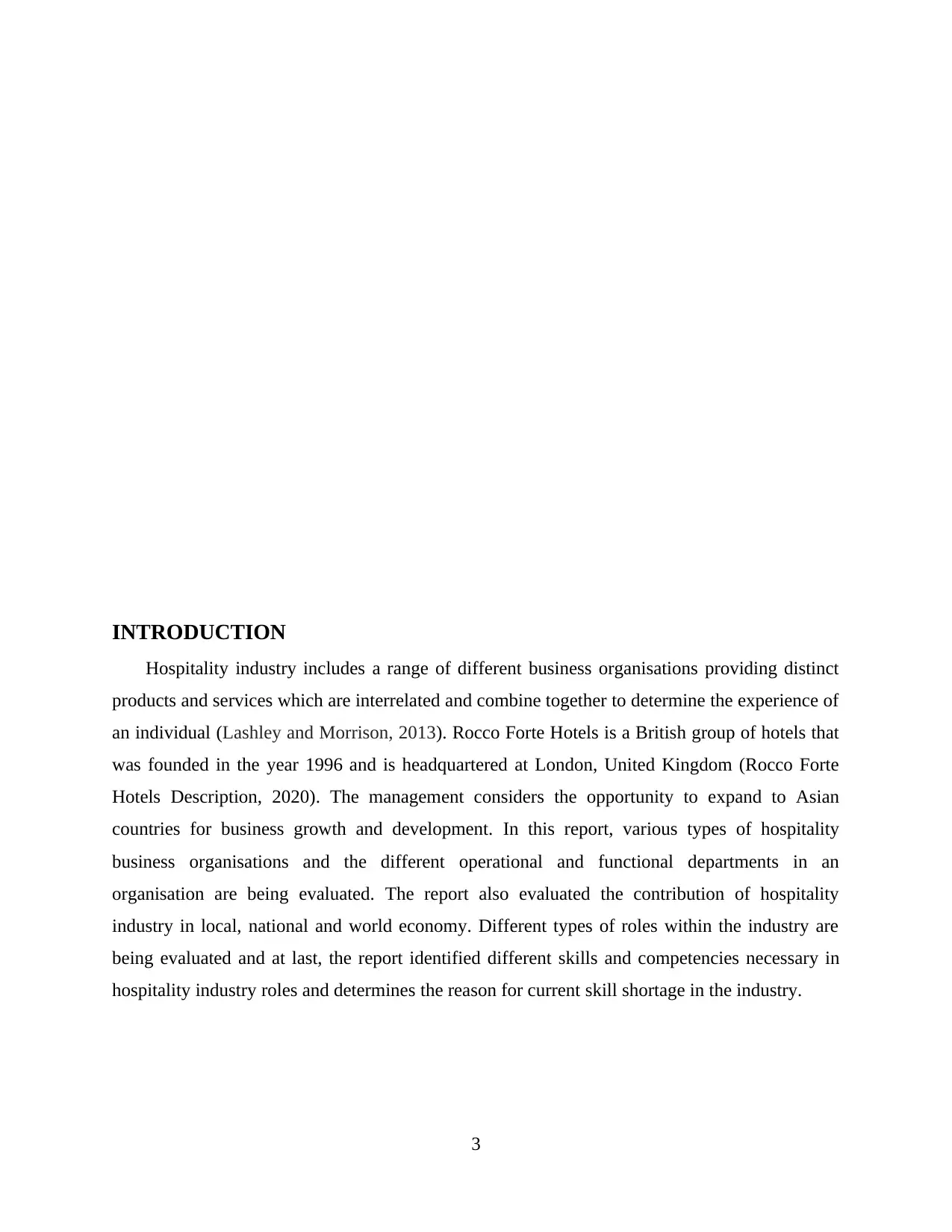
INTRODUCTION
Hospitality industry includes a range of different business organisations providing distinct
products and services which are interrelated and combine together to determine the experience of
an individual (Lashley and Morrison, 2013). Rocco Forte Hotels is a British group of hotels that
was founded in the year 1996 and is headquartered at London, United Kingdom (Rocco Forte
Hotels Description, 2020). The management considers the opportunity to expand to Asian
countries for business growth and development. In this report, various types of hospitality
business organisations and the different operational and functional departments in an
organisation are being evaluated. The report also evaluated the contribution of hospitality
industry in local, national and world economy. Different types of roles within the industry are
being evaluated and at last, the report identified different skills and competencies necessary in
hospitality industry roles and determines the reason for current skill shortage in the industry.
3
Hospitality industry includes a range of different business organisations providing distinct
products and services which are interrelated and combine together to determine the experience of
an individual (Lashley and Morrison, 2013). Rocco Forte Hotels is a British group of hotels that
was founded in the year 1996 and is headquartered at London, United Kingdom (Rocco Forte
Hotels Description, 2020). The management considers the opportunity to expand to Asian
countries for business growth and development. In this report, various types of hospitality
business organisations and the different operational and functional departments in an
organisation are being evaluated. The report also evaluated the contribution of hospitality
industry in local, national and world economy. Different types of roles within the industry are
being evaluated and at last, the report identified different skills and competencies necessary in
hospitality industry roles and determines the reason for current skill shortage in the industry.
3
⊘ This is a preview!⊘
Do you want full access?
Subscribe today to unlock all pages.

Trusted by 1+ million students worldwide
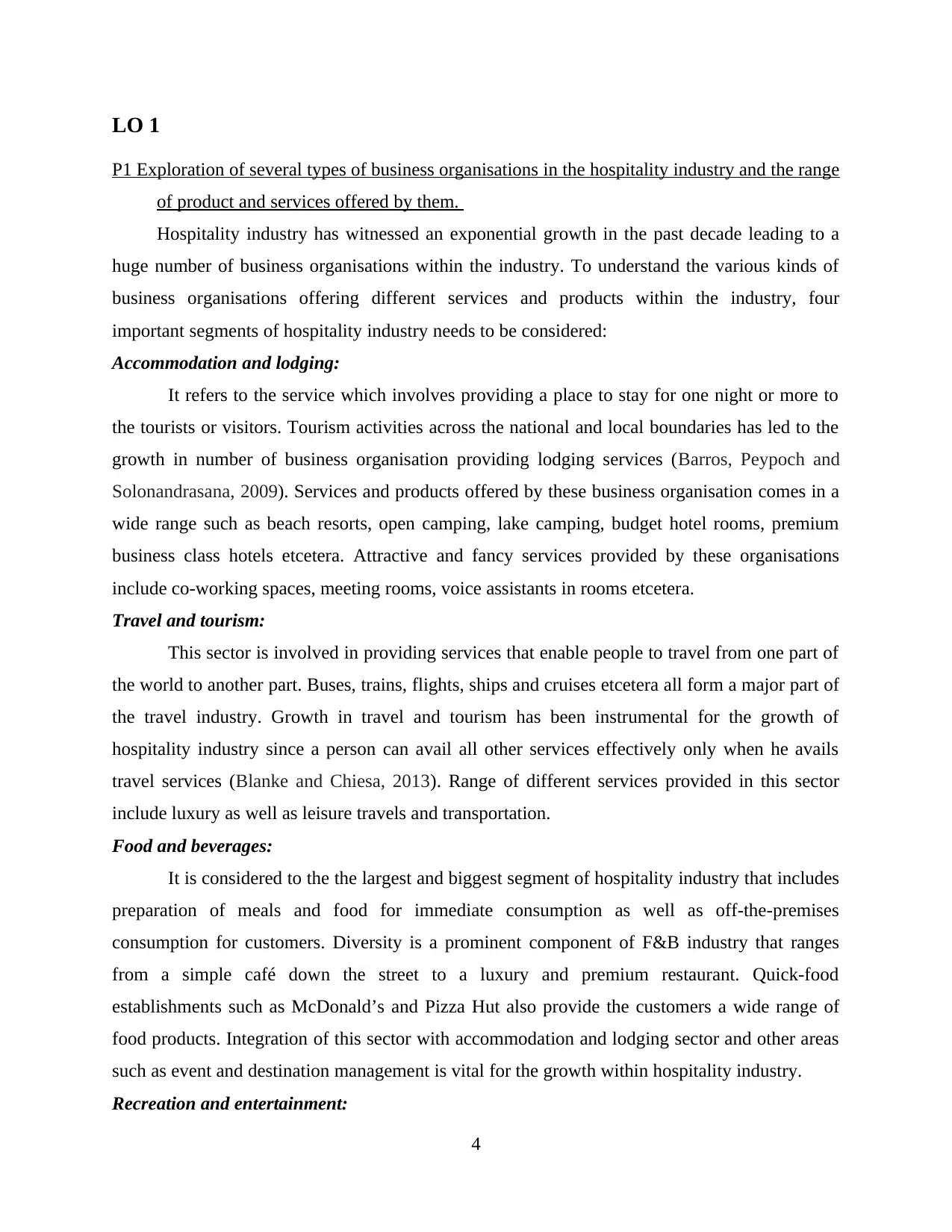
LO 1
P1 Exploration of several types of business organisations in the hospitality industry and the range
of product and services offered by them.
Hospitality industry has witnessed an exponential growth in the past decade leading to a
huge number of business organisations within the industry. To understand the various kinds of
business organisations offering different services and products within the industry, four
important segments of hospitality industry needs to be considered:
Accommodation and lodging:
It refers to the service which involves providing a place to stay for one night or more to
the tourists or visitors. Tourism activities across the national and local boundaries has led to the
growth in number of business organisation providing lodging services (Barros, Peypoch and
Solonandrasana, 2009). Services and products offered by these business organisation comes in a
wide range such as beach resorts, open camping, lake camping, budget hotel rooms, premium
business class hotels etcetera. Attractive and fancy services provided by these organisations
include co-working spaces, meeting rooms, voice assistants in rooms etcetera.
Travel and tourism:
This sector is involved in providing services that enable people to travel from one part of
the world to another part. Buses, trains, flights, ships and cruises etcetera all form a major part of
the travel industry. Growth in travel and tourism has been instrumental for the growth of
hospitality industry since a person can avail all other services effectively only when he avails
travel services (Blanke and Chiesa, 2013). Range of different services provided in this sector
include luxury as well as leisure travels and transportation.
Food and beverages:
It is considered to the the largest and biggest segment of hospitality industry that includes
preparation of meals and food for immediate consumption as well as off-the-premises
consumption for customers. Diversity is a prominent component of F&B industry that ranges
from a simple café down the street to a luxury and premium restaurant. Quick-food
establishments such as McDonald’s and Pizza Hut also provide the customers a wide range of
food products. Integration of this sector with accommodation and lodging sector and other areas
such as event and destination management is vital for the growth within hospitality industry.
Recreation and entertainment:
4
P1 Exploration of several types of business organisations in the hospitality industry and the range
of product and services offered by them.
Hospitality industry has witnessed an exponential growth in the past decade leading to a
huge number of business organisations within the industry. To understand the various kinds of
business organisations offering different services and products within the industry, four
important segments of hospitality industry needs to be considered:
Accommodation and lodging:
It refers to the service which involves providing a place to stay for one night or more to
the tourists or visitors. Tourism activities across the national and local boundaries has led to the
growth in number of business organisation providing lodging services (Barros, Peypoch and
Solonandrasana, 2009). Services and products offered by these business organisation comes in a
wide range such as beach resorts, open camping, lake camping, budget hotel rooms, premium
business class hotels etcetera. Attractive and fancy services provided by these organisations
include co-working spaces, meeting rooms, voice assistants in rooms etcetera.
Travel and tourism:
This sector is involved in providing services that enable people to travel from one part of
the world to another part. Buses, trains, flights, ships and cruises etcetera all form a major part of
the travel industry. Growth in travel and tourism has been instrumental for the growth of
hospitality industry since a person can avail all other services effectively only when he avails
travel services (Blanke and Chiesa, 2013). Range of different services provided in this sector
include luxury as well as leisure travels and transportation.
Food and beverages:
It is considered to the the largest and biggest segment of hospitality industry that includes
preparation of meals and food for immediate consumption as well as off-the-premises
consumption for customers. Diversity is a prominent component of F&B industry that ranges
from a simple café down the street to a luxury and premium restaurant. Quick-food
establishments such as McDonald’s and Pizza Hut also provide the customers a wide range of
food products. Integration of this sector with accommodation and lodging sector and other areas
such as event and destination management is vital for the growth within hospitality industry.
Recreation and entertainment:
4
Paraphrase This Document
Need a fresh take? Get an instant paraphrase of this document with our AI Paraphraser
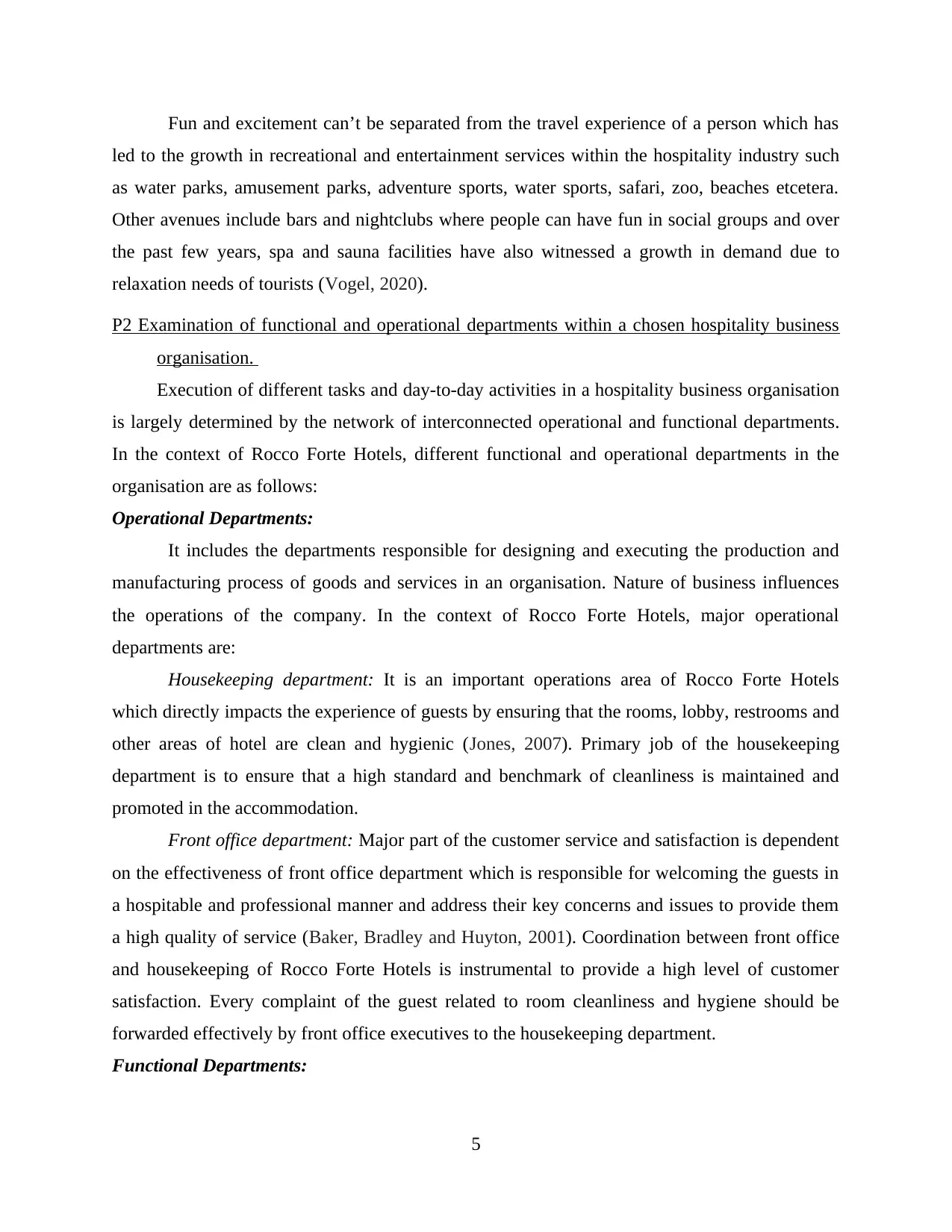
Fun and excitement can’t be separated from the travel experience of a person which has
led to the growth in recreational and entertainment services within the hospitality industry such
as water parks, amusement parks, adventure sports, water sports, safari, zoo, beaches etcetera.
Other avenues include bars and nightclubs where people can have fun in social groups and over
the past few years, spa and sauna facilities have also witnessed a growth in demand due to
relaxation needs of tourists (Vogel, 2020).
P2 Examination of functional and operational departments within a chosen hospitality business
organisation.
Execution of different tasks and day-to-day activities in a hospitality business organisation
is largely determined by the network of interconnected operational and functional departments.
In the context of Rocco Forte Hotels, different functional and operational departments in the
organisation are as follows:
Operational Departments:
It includes the departments responsible for designing and executing the production and
manufacturing process of goods and services in an organisation. Nature of business influences
the operations of the company. In the context of Rocco Forte Hotels, major operational
departments are:
Housekeeping department: It is an important operations area of Rocco Forte Hotels
which directly impacts the experience of guests by ensuring that the rooms, lobby, restrooms and
other areas of hotel are clean and hygienic (Jones, 2007). Primary job of the housekeeping
department is to ensure that a high standard and benchmark of cleanliness is maintained and
promoted in the accommodation.
Front office department: Major part of the customer service and satisfaction is dependent
on the effectiveness of front office department which is responsible for welcoming the guests in
a hospitable and professional manner and address their key concerns and issues to provide them
a high quality of service (Baker, Bradley and Huyton, 2001). Coordination between front office
and housekeeping of Rocco Forte Hotels is instrumental to provide a high level of customer
satisfaction. Every complaint of the guest related to room cleanliness and hygiene should be
forwarded effectively by front office executives to the housekeeping department.
Functional Departments:
5
led to the growth in recreational and entertainment services within the hospitality industry such
as water parks, amusement parks, adventure sports, water sports, safari, zoo, beaches etcetera.
Other avenues include bars and nightclubs where people can have fun in social groups and over
the past few years, spa and sauna facilities have also witnessed a growth in demand due to
relaxation needs of tourists (Vogel, 2020).
P2 Examination of functional and operational departments within a chosen hospitality business
organisation.
Execution of different tasks and day-to-day activities in a hospitality business organisation
is largely determined by the network of interconnected operational and functional departments.
In the context of Rocco Forte Hotels, different functional and operational departments in the
organisation are as follows:
Operational Departments:
It includes the departments responsible for designing and executing the production and
manufacturing process of goods and services in an organisation. Nature of business influences
the operations of the company. In the context of Rocco Forte Hotels, major operational
departments are:
Housekeeping department: It is an important operations area of Rocco Forte Hotels
which directly impacts the experience of guests by ensuring that the rooms, lobby, restrooms and
other areas of hotel are clean and hygienic (Jones, 2007). Primary job of the housekeeping
department is to ensure that a high standard and benchmark of cleanliness is maintained and
promoted in the accommodation.
Front office department: Major part of the customer service and satisfaction is dependent
on the effectiveness of front office department which is responsible for welcoming the guests in
a hospitable and professional manner and address their key concerns and issues to provide them
a high quality of service (Baker, Bradley and Huyton, 2001). Coordination between front office
and housekeeping of Rocco Forte Hotels is instrumental to provide a high level of customer
satisfaction. Every complaint of the guest related to room cleanliness and hygiene should be
forwarded effectively by front office executives to the housekeeping department.
Functional Departments:
5
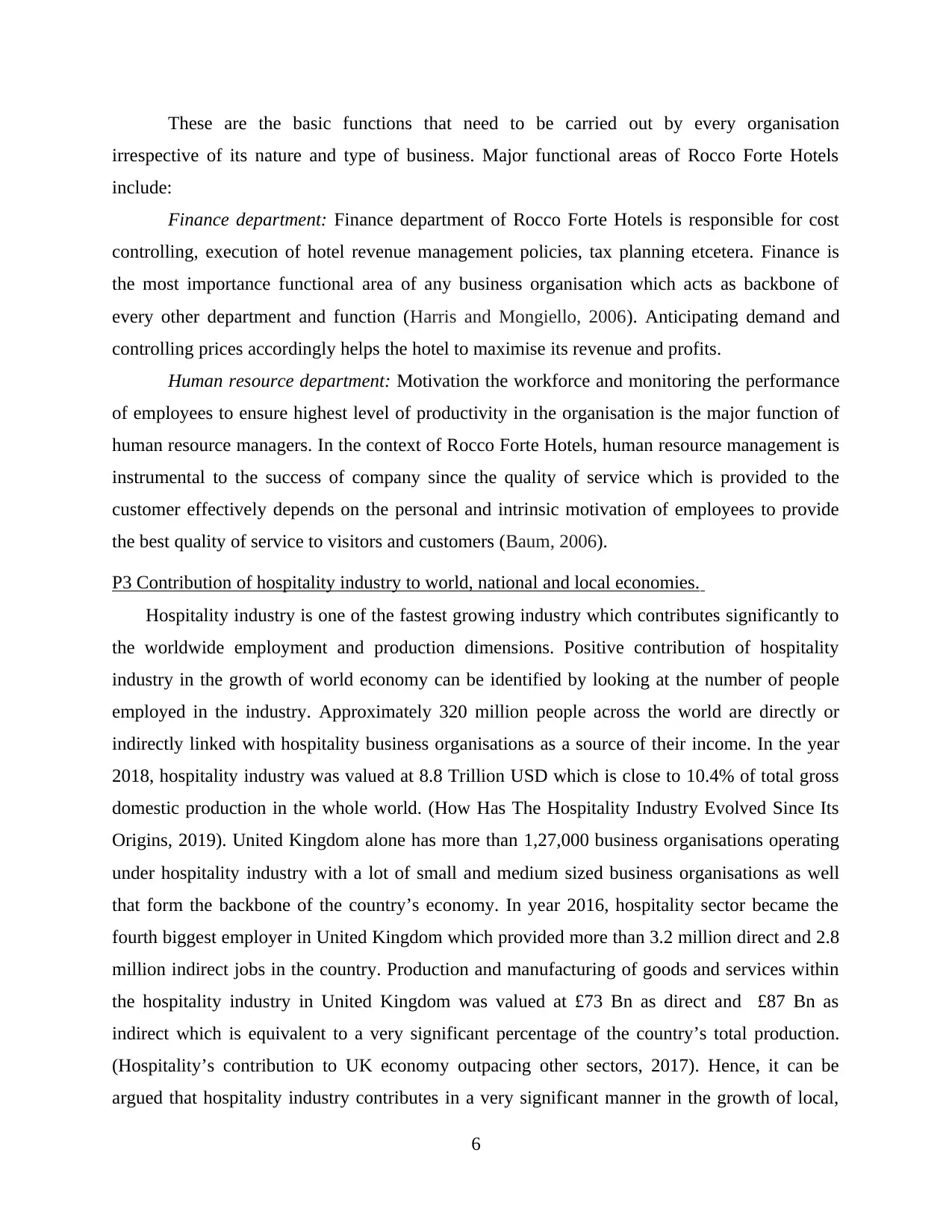
These are the basic functions that need to be carried out by every organisation
irrespective of its nature and type of business. Major functional areas of Rocco Forte Hotels
include:
Finance department: Finance department of Rocco Forte Hotels is responsible for cost
controlling, execution of hotel revenue management policies, tax planning etcetera. Finance is
the most importance functional area of any business organisation which acts as backbone of
every other department and function (Harris and Mongiello, 2006). Anticipating demand and
controlling prices accordingly helps the hotel to maximise its revenue and profits.
Human resource department: Motivation the workforce and monitoring the performance
of employees to ensure highest level of productivity in the organisation is the major function of
human resource managers. In the context of Rocco Forte Hotels, human resource management is
instrumental to the success of company since the quality of service which is provided to the
customer effectively depends on the personal and intrinsic motivation of employees to provide
the best quality of service to visitors and customers (Baum, 2006).
P3 Contribution of hospitality industry to world, national and local economies.
Hospitality industry is one of the fastest growing industry which contributes significantly to
the worldwide employment and production dimensions. Positive contribution of hospitality
industry in the growth of world economy can be identified by looking at the number of people
employed in the industry. Approximately 320 million people across the world are directly or
indirectly linked with hospitality business organisations as a source of their income. In the year
2018, hospitality industry was valued at 8.8 Trillion USD which is close to 10.4% of total gross
domestic production in the whole world. (How Has The Hospitality Industry Evolved Since Its
Origins, 2019). United Kingdom alone has more than 1,27,000 business organisations operating
under hospitality industry with a lot of small and medium sized business organisations as well
that form the backbone of the country’s economy. In year 2016, hospitality sector became the
fourth biggest employer in United Kingdom which provided more than 3.2 million direct and 2.8
million indirect jobs in the country. Production and manufacturing of goods and services within
the hospitality industry in United Kingdom was valued at £73 Bn as direct and £87 Bn as
indirect which is equivalent to a very significant percentage of the country’s total production.
(Hospitality’s contribution to UK economy outpacing other sectors, 2017). Hence, it can be
argued that hospitality industry contributes in a very significant manner in the growth of local,
6
irrespective of its nature and type of business. Major functional areas of Rocco Forte Hotels
include:
Finance department: Finance department of Rocco Forte Hotels is responsible for cost
controlling, execution of hotel revenue management policies, tax planning etcetera. Finance is
the most importance functional area of any business organisation which acts as backbone of
every other department and function (Harris and Mongiello, 2006). Anticipating demand and
controlling prices accordingly helps the hotel to maximise its revenue and profits.
Human resource department: Motivation the workforce and monitoring the performance
of employees to ensure highest level of productivity in the organisation is the major function of
human resource managers. In the context of Rocco Forte Hotels, human resource management is
instrumental to the success of company since the quality of service which is provided to the
customer effectively depends on the personal and intrinsic motivation of employees to provide
the best quality of service to visitors and customers (Baum, 2006).
P3 Contribution of hospitality industry to world, national and local economies.
Hospitality industry is one of the fastest growing industry which contributes significantly to
the worldwide employment and production dimensions. Positive contribution of hospitality
industry in the growth of world economy can be identified by looking at the number of people
employed in the industry. Approximately 320 million people across the world are directly or
indirectly linked with hospitality business organisations as a source of their income. In the year
2018, hospitality industry was valued at 8.8 Trillion USD which is close to 10.4% of total gross
domestic production in the whole world. (How Has The Hospitality Industry Evolved Since Its
Origins, 2019). United Kingdom alone has more than 1,27,000 business organisations operating
under hospitality industry with a lot of small and medium sized business organisations as well
that form the backbone of the country’s economy. In year 2016, hospitality sector became the
fourth biggest employer in United Kingdom which provided more than 3.2 million direct and 2.8
million indirect jobs in the country. Production and manufacturing of goods and services within
the hospitality industry in United Kingdom was valued at £73 Bn as direct and £87 Bn as
indirect which is equivalent to a very significant percentage of the country’s total production.
(Hospitality’s contribution to UK economy outpacing other sectors, 2017). Hence, it can be
argued that hospitality industry contributes in a very significant manner in the growth of local,
6
⊘ This is a preview!⊘
Do you want full access?
Subscribe today to unlock all pages.

Trusted by 1+ million students worldwide
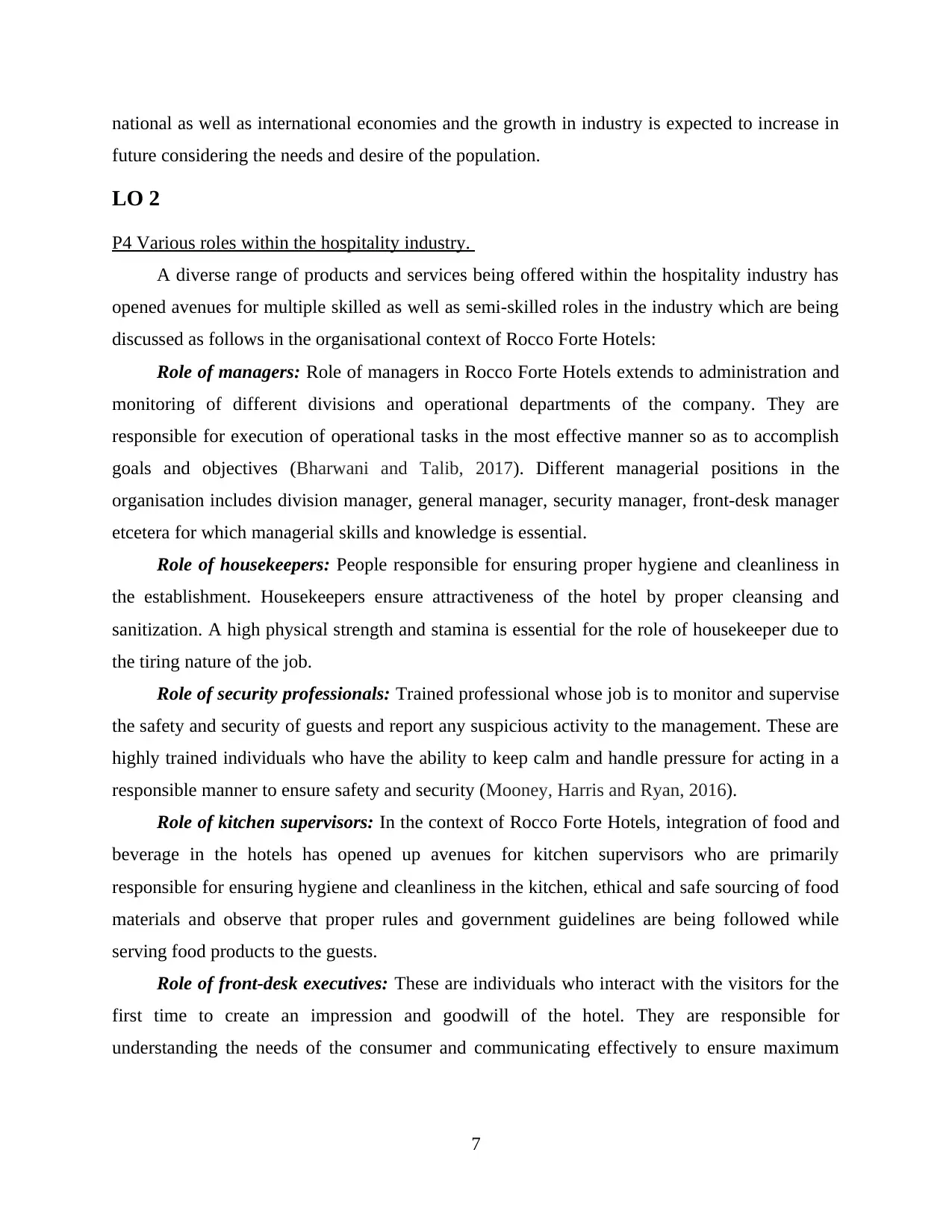
national as well as international economies and the growth in industry is expected to increase in
future considering the needs and desire of the population.
LO 2
P4 Various roles within the hospitality industry.
A diverse range of products and services being offered within the hospitality industry has
opened avenues for multiple skilled as well as semi-skilled roles in the industry which are being
discussed as follows in the organisational context of Rocco Forte Hotels:
Role of managers: Role of managers in Rocco Forte Hotels extends to administration and
monitoring of different divisions and operational departments of the company. They are
responsible for execution of operational tasks in the most effective manner so as to accomplish
goals and objectives (Bharwani and Talib, 2017). Different managerial positions in the
organisation includes division manager, general manager, security manager, front-desk manager
etcetera for which managerial skills and knowledge is essential.
Role of housekeepers: People responsible for ensuring proper hygiene and cleanliness in
the establishment. Housekeepers ensure attractiveness of the hotel by proper cleansing and
sanitization. A high physical strength and stamina is essential for the role of housekeeper due to
the tiring nature of the job.
Role of security professionals: Trained professional whose job is to monitor and supervise
the safety and security of guests and report any suspicious activity to the management. These are
highly trained individuals who have the ability to keep calm and handle pressure for acting in a
responsible manner to ensure safety and security (Mooney, Harris and Ryan, 2016).
Role of kitchen supervisors: In the context of Rocco Forte Hotels, integration of food and
beverage in the hotels has opened up avenues for kitchen supervisors who are primarily
responsible for ensuring hygiene and cleanliness in the kitchen, ethical and safe sourcing of food
materials and observe that proper rules and government guidelines are being followed while
serving food products to the guests.
Role of front-desk executives: These are individuals who interact with the visitors for the
first time to create an impression and goodwill of the hotel. They are responsible for
understanding the needs of the consumer and communicating effectively to ensure maximum
7
future considering the needs and desire of the population.
LO 2
P4 Various roles within the hospitality industry.
A diverse range of products and services being offered within the hospitality industry has
opened avenues for multiple skilled as well as semi-skilled roles in the industry which are being
discussed as follows in the organisational context of Rocco Forte Hotels:
Role of managers: Role of managers in Rocco Forte Hotels extends to administration and
monitoring of different divisions and operational departments of the company. They are
responsible for execution of operational tasks in the most effective manner so as to accomplish
goals and objectives (Bharwani and Talib, 2017). Different managerial positions in the
organisation includes division manager, general manager, security manager, front-desk manager
etcetera for which managerial skills and knowledge is essential.
Role of housekeepers: People responsible for ensuring proper hygiene and cleanliness in
the establishment. Housekeepers ensure attractiveness of the hotel by proper cleansing and
sanitization. A high physical strength and stamina is essential for the role of housekeeper due to
the tiring nature of the job.
Role of security professionals: Trained professional whose job is to monitor and supervise
the safety and security of guests and report any suspicious activity to the management. These are
highly trained individuals who have the ability to keep calm and handle pressure for acting in a
responsible manner to ensure safety and security (Mooney, Harris and Ryan, 2016).
Role of kitchen supervisors: In the context of Rocco Forte Hotels, integration of food and
beverage in the hotels has opened up avenues for kitchen supervisors who are primarily
responsible for ensuring hygiene and cleanliness in the kitchen, ethical and safe sourcing of food
materials and observe that proper rules and government guidelines are being followed while
serving food products to the guests.
Role of front-desk executives: These are individuals who interact with the visitors for the
first time to create an impression and goodwill of the hotel. They are responsible for
understanding the needs of the consumer and communicating effectively to ensure maximum
7
Paraphrase This Document
Need a fresh take? Get an instant paraphrase of this document with our AI Paraphraser
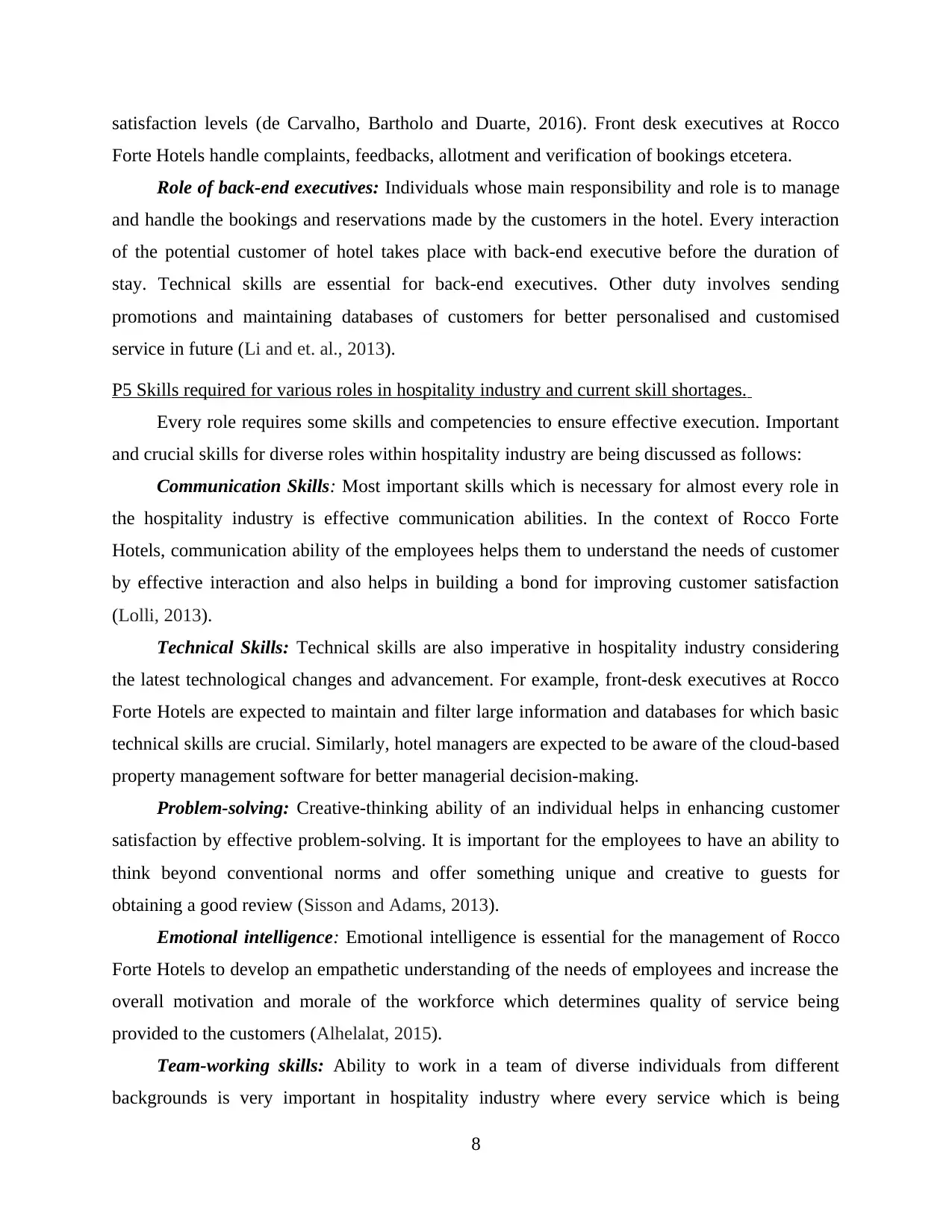
satisfaction levels (de Carvalho, Bartholo and Duarte, 2016). Front desk executives at Rocco
Forte Hotels handle complaints, feedbacks, allotment and verification of bookings etcetera.
Role of back-end executives: Individuals whose main responsibility and role is to manage
and handle the bookings and reservations made by the customers in the hotel. Every interaction
of the potential customer of hotel takes place with back-end executive before the duration of
stay. Technical skills are essential for back-end executives. Other duty involves sending
promotions and maintaining databases of customers for better personalised and customised
service in future (Li and et. al., 2013).
P5 Skills required for various roles in hospitality industry and current skill shortages.
Every role requires some skills and competencies to ensure effective execution. Important
and crucial skills for diverse roles within hospitality industry are being discussed as follows:
Communication Skills: Most important skills which is necessary for almost every role in
the hospitality industry is effective communication abilities. In the context of Rocco Forte
Hotels, communication ability of the employees helps them to understand the needs of customer
by effective interaction and also helps in building a bond for improving customer satisfaction
(Lolli, 2013).
Technical Skills: Technical skills are also imperative in hospitality industry considering
the latest technological changes and advancement. For example, front-desk executives at Rocco
Forte Hotels are expected to maintain and filter large information and databases for which basic
technical skills are crucial. Similarly, hotel managers are expected to be aware of the cloud-based
property management software for better managerial decision-making.
Problem-solving: Creative-thinking ability of an individual helps in enhancing customer
satisfaction by effective problem-solving. It is important for the employees to have an ability to
think beyond conventional norms and offer something unique and creative to guests for
obtaining a good review (Sisson and Adams, 2013).
Emotional intelligence: Emotional intelligence is essential for the management of Rocco
Forte Hotels to develop an empathetic understanding of the needs of employees and increase the
overall motivation and morale of the workforce which determines quality of service being
provided to the customers (Alhelalat, 2015).
Team-working skills: Ability to work in a team of diverse individuals from different
backgrounds is very important in hospitality industry where every service which is being
8
Forte Hotels handle complaints, feedbacks, allotment and verification of bookings etcetera.
Role of back-end executives: Individuals whose main responsibility and role is to manage
and handle the bookings and reservations made by the customers in the hotel. Every interaction
of the potential customer of hotel takes place with back-end executive before the duration of
stay. Technical skills are essential for back-end executives. Other duty involves sending
promotions and maintaining databases of customers for better personalised and customised
service in future (Li and et. al., 2013).
P5 Skills required for various roles in hospitality industry and current skill shortages.
Every role requires some skills and competencies to ensure effective execution. Important
and crucial skills for diverse roles within hospitality industry are being discussed as follows:
Communication Skills: Most important skills which is necessary for almost every role in
the hospitality industry is effective communication abilities. In the context of Rocco Forte
Hotels, communication ability of the employees helps them to understand the needs of customer
by effective interaction and also helps in building a bond for improving customer satisfaction
(Lolli, 2013).
Technical Skills: Technical skills are also imperative in hospitality industry considering
the latest technological changes and advancement. For example, front-desk executives at Rocco
Forte Hotels are expected to maintain and filter large information and databases for which basic
technical skills are crucial. Similarly, hotel managers are expected to be aware of the cloud-based
property management software for better managerial decision-making.
Problem-solving: Creative-thinking ability of an individual helps in enhancing customer
satisfaction by effective problem-solving. It is important for the employees to have an ability to
think beyond conventional norms and offer something unique and creative to guests for
obtaining a good review (Sisson and Adams, 2013).
Emotional intelligence: Emotional intelligence is essential for the management of Rocco
Forte Hotels to develop an empathetic understanding of the needs of employees and increase the
overall motivation and morale of the workforce which determines quality of service being
provided to the customers (Alhelalat, 2015).
Team-working skills: Ability to work in a team of diverse individuals from different
backgrounds is very important in hospitality industry where every service which is being
8
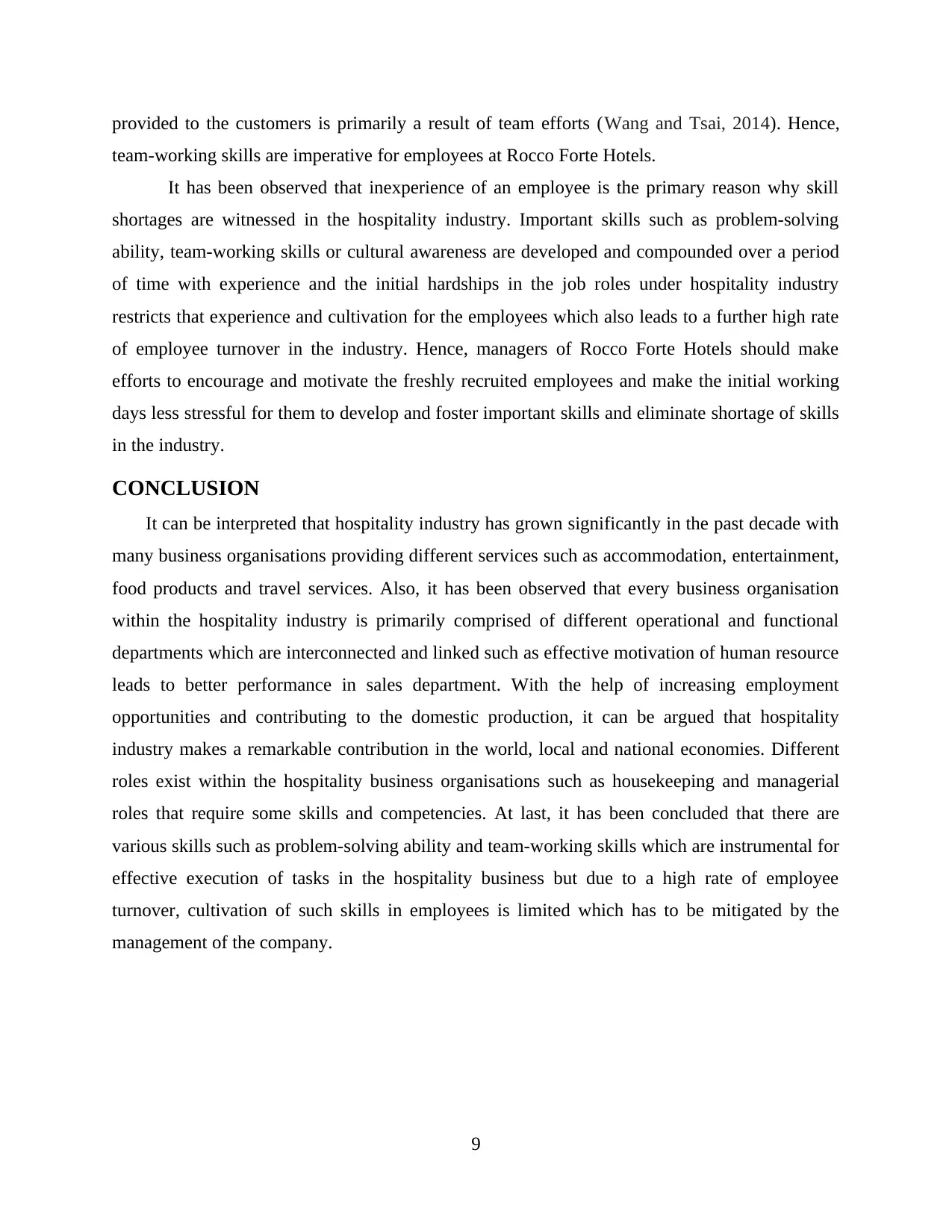
provided to the customers is primarily a result of team efforts (Wang and Tsai, 2014). Hence,
team-working skills are imperative for employees at Rocco Forte Hotels.
It has been observed that inexperience of an employee is the primary reason why skill
shortages are witnessed in the hospitality industry. Important skills such as problem-solving
ability, team-working skills or cultural awareness are developed and compounded over a period
of time with experience and the initial hardships in the job roles under hospitality industry
restricts that experience and cultivation for the employees which also leads to a further high rate
of employee turnover in the industry. Hence, managers of Rocco Forte Hotels should make
efforts to encourage and motivate the freshly recruited employees and make the initial working
days less stressful for them to develop and foster important skills and eliminate shortage of skills
in the industry.
CONCLUSION
It can be interpreted that hospitality industry has grown significantly in the past decade with
many business organisations providing different services such as accommodation, entertainment,
food products and travel services. Also, it has been observed that every business organisation
within the hospitality industry is primarily comprised of different operational and functional
departments which are interconnected and linked such as effective motivation of human resource
leads to better performance in sales department. With the help of increasing employment
opportunities and contributing to the domestic production, it can be argued that hospitality
industry makes a remarkable contribution in the world, local and national economies. Different
roles exist within the hospitality business organisations such as housekeeping and managerial
roles that require some skills and competencies. At last, it has been concluded that there are
various skills such as problem-solving ability and team-working skills which are instrumental for
effective execution of tasks in the hospitality business but due to a high rate of employee
turnover, cultivation of such skills in employees is limited which has to be mitigated by the
management of the company.
9
team-working skills are imperative for employees at Rocco Forte Hotels.
It has been observed that inexperience of an employee is the primary reason why skill
shortages are witnessed in the hospitality industry. Important skills such as problem-solving
ability, team-working skills or cultural awareness are developed and compounded over a period
of time with experience and the initial hardships in the job roles under hospitality industry
restricts that experience and cultivation for the employees which also leads to a further high rate
of employee turnover in the industry. Hence, managers of Rocco Forte Hotels should make
efforts to encourage and motivate the freshly recruited employees and make the initial working
days less stressful for them to develop and foster important skills and eliminate shortage of skills
in the industry.
CONCLUSION
It can be interpreted that hospitality industry has grown significantly in the past decade with
many business organisations providing different services such as accommodation, entertainment,
food products and travel services. Also, it has been observed that every business organisation
within the hospitality industry is primarily comprised of different operational and functional
departments which are interconnected and linked such as effective motivation of human resource
leads to better performance in sales department. With the help of increasing employment
opportunities and contributing to the domestic production, it can be argued that hospitality
industry makes a remarkable contribution in the world, local and national economies. Different
roles exist within the hospitality business organisations such as housekeeping and managerial
roles that require some skills and competencies. At last, it has been concluded that there are
various skills such as problem-solving ability and team-working skills which are instrumental for
effective execution of tasks in the hospitality business but due to a high rate of employee
turnover, cultivation of such skills in employees is limited which has to be mitigated by the
management of the company.
9
⊘ This is a preview!⊘
Do you want full access?
Subscribe today to unlock all pages.

Trusted by 1+ million students worldwide
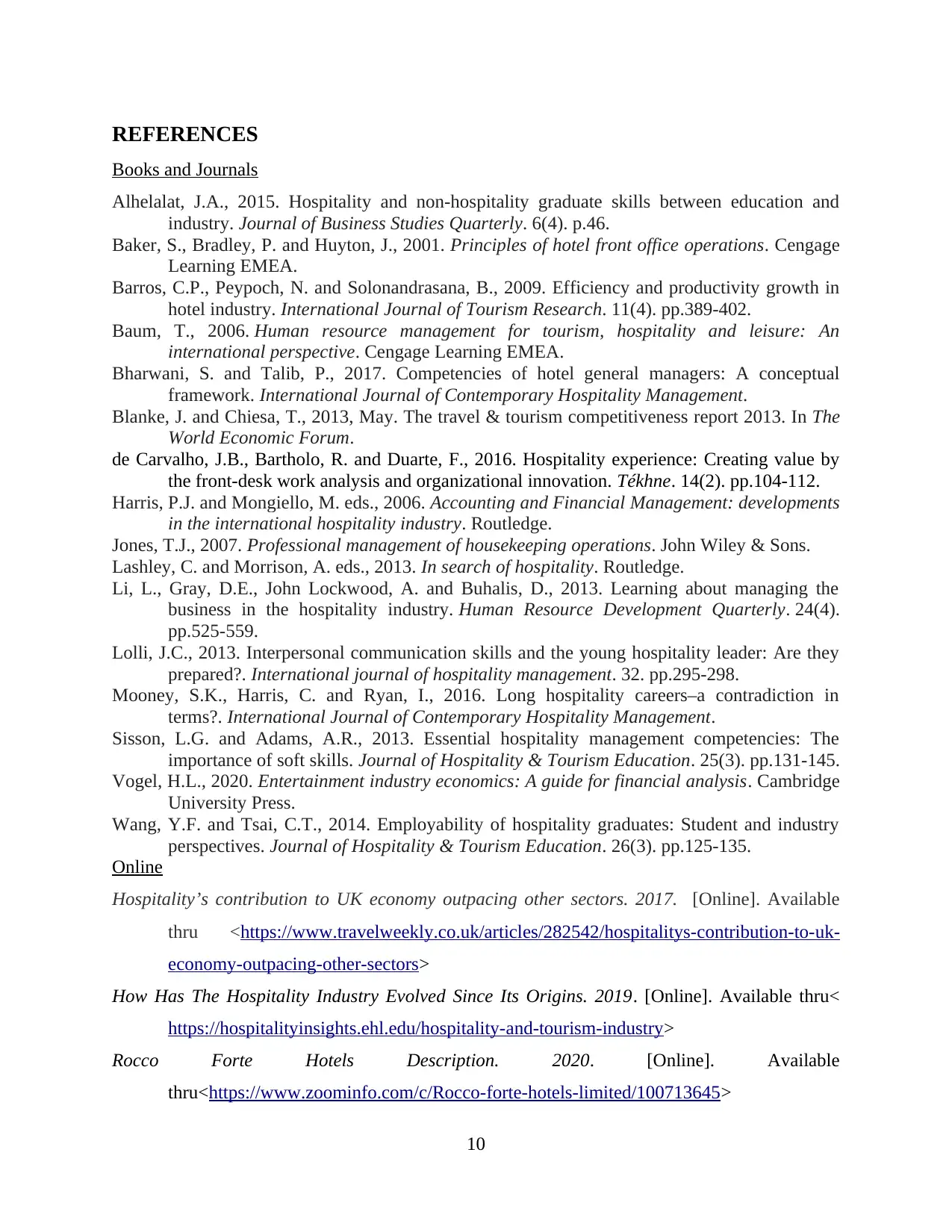
REFERENCES
Books and Journals
Alhelalat, J.A., 2015. Hospitality and non-hospitality graduate skills between education and
industry. Journal of Business Studies Quarterly. 6(4). p.46.
Baker, S., Bradley, P. and Huyton, J., 2001. Principles of hotel front office operations. Cengage
Learning EMEA.
Barros, C.P., Peypoch, N. and Solonandrasana, B., 2009. Efficiency and productivity growth in
hotel industry. International Journal of Tourism Research. 11(4). pp.389-402.
Baum, T., 2006. Human resource management for tourism, hospitality and leisure: An
international perspective. Cengage Learning EMEA.
Bharwani, S. and Talib, P., 2017. Competencies of hotel general managers: A conceptual
framework. International Journal of Contemporary Hospitality Management.
Blanke, J. and Chiesa, T., 2013, May. The travel & tourism competitiveness report 2013. In The
World Economic Forum.
de Carvalho, J.B., Bartholo, R. and Duarte, F., 2016. Hospitality experience: Creating value by
the front-desk work analysis and organizational innovation. Tékhne. 14(2). pp.104-112.
Harris, P.J. and Mongiello, M. eds., 2006. Accounting and Financial Management: developments
in the international hospitality industry. Routledge.
Jones, T.J., 2007. Professional management of housekeeping operations. John Wiley & Sons.
Lashley, C. and Morrison, A. eds., 2013. In search of hospitality. Routledge.
Li, L., Gray, D.E., John Lockwood, A. and Buhalis, D., 2013. Learning about managing the
business in the hospitality industry. Human Resource Development Quarterly. 24(4).
pp.525-559.
Lolli, J.C., 2013. Interpersonal communication skills and the young hospitality leader: Are they
prepared?. International journal of hospitality management. 32. pp.295-298.
Mooney, S.K., Harris, C. and Ryan, I., 2016. Long hospitality careers–a contradiction in
terms?. International Journal of Contemporary Hospitality Management.
Sisson, L.G. and Adams, A.R., 2013. Essential hospitality management competencies: The
importance of soft skills. Journal of Hospitality & Tourism Education. 25(3). pp.131-145.
Vogel, H.L., 2020. Entertainment industry economics: A guide for financial analysis. Cambridge
University Press.
Wang, Y.F. and Tsai, C.T., 2014. Employability of hospitality graduates: Student and industry
perspectives. Journal of Hospitality & Tourism Education. 26(3). pp.125-135.
Online
Hospitality’s contribution to UK economy outpacing other sectors. 2017. [Online]. Available
thru <https://www.travelweekly.co.uk/articles/282542/hospitalitys-contribution-to-uk-
economy-outpacing-other-sectors>
How Has The Hospitality Industry Evolved Since Its Origins. 2019. [Online]. Available thru<
https://hospitalityinsights.ehl.edu/hospitality-and-tourism-industry>
Rocco Forte Hotels Description. 2020. [Online]. Available
thru<https://www.zoominfo.com/c/Rocco-forte-hotels-limited/100713645>
10
Books and Journals
Alhelalat, J.A., 2015. Hospitality and non-hospitality graduate skills between education and
industry. Journal of Business Studies Quarterly. 6(4). p.46.
Baker, S., Bradley, P. and Huyton, J., 2001. Principles of hotel front office operations. Cengage
Learning EMEA.
Barros, C.P., Peypoch, N. and Solonandrasana, B., 2009. Efficiency and productivity growth in
hotel industry. International Journal of Tourism Research. 11(4). pp.389-402.
Baum, T., 2006. Human resource management for tourism, hospitality and leisure: An
international perspective. Cengage Learning EMEA.
Bharwani, S. and Talib, P., 2017. Competencies of hotel general managers: A conceptual
framework. International Journal of Contemporary Hospitality Management.
Blanke, J. and Chiesa, T., 2013, May. The travel & tourism competitiveness report 2013. In The
World Economic Forum.
de Carvalho, J.B., Bartholo, R. and Duarte, F., 2016. Hospitality experience: Creating value by
the front-desk work analysis and organizational innovation. Tékhne. 14(2). pp.104-112.
Harris, P.J. and Mongiello, M. eds., 2006. Accounting and Financial Management: developments
in the international hospitality industry. Routledge.
Jones, T.J., 2007. Professional management of housekeeping operations. John Wiley & Sons.
Lashley, C. and Morrison, A. eds., 2013. In search of hospitality. Routledge.
Li, L., Gray, D.E., John Lockwood, A. and Buhalis, D., 2013. Learning about managing the
business in the hospitality industry. Human Resource Development Quarterly. 24(4).
pp.525-559.
Lolli, J.C., 2013. Interpersonal communication skills and the young hospitality leader: Are they
prepared?. International journal of hospitality management. 32. pp.295-298.
Mooney, S.K., Harris, C. and Ryan, I., 2016. Long hospitality careers–a contradiction in
terms?. International Journal of Contemporary Hospitality Management.
Sisson, L.G. and Adams, A.R., 2013. Essential hospitality management competencies: The
importance of soft skills. Journal of Hospitality & Tourism Education. 25(3). pp.131-145.
Vogel, H.L., 2020. Entertainment industry economics: A guide for financial analysis. Cambridge
University Press.
Wang, Y.F. and Tsai, C.T., 2014. Employability of hospitality graduates: Student and industry
perspectives. Journal of Hospitality & Tourism Education. 26(3). pp.125-135.
Online
Hospitality’s contribution to UK economy outpacing other sectors. 2017. [Online]. Available
thru <https://www.travelweekly.co.uk/articles/282542/hospitalitys-contribution-to-uk-
economy-outpacing-other-sectors>
How Has The Hospitality Industry Evolved Since Its Origins. 2019. [Online]. Available thru<
https://hospitalityinsights.ehl.edu/hospitality-and-tourism-industry>
Rocco Forte Hotels Description. 2020. [Online]. Available
thru<https://www.zoominfo.com/c/Rocco-forte-hotels-limited/100713645>
10
Paraphrase This Document
Need a fresh take? Get an instant paraphrase of this document with our AI Paraphraser

11
1 out of 11
Related Documents
Your All-in-One AI-Powered Toolkit for Academic Success.
+13062052269
info@desklib.com
Available 24*7 on WhatsApp / Email
![[object Object]](/_next/static/media/star-bottom.7253800d.svg)
Unlock your academic potential
Copyright © 2020–2026 A2Z Services. All Rights Reserved. Developed and managed by ZUCOL.





